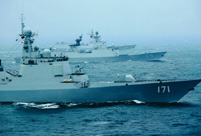

CHINA’s economic dynamics have been brought into sharp focus by the slowdown in the global economy. The growth of the Chinese economy slowed down to 6.9% in 2015, with a 38% decline in Africa’s total export value to China.
Under the circumstances, it is necessary to differentiate between value and volume. The facts are, although its value has dropped dramatically, the volume of Chinese commodity imports from Africa has not declined.
According to the latest report from China’s National Bureau of Statistics on export and import volumes and values, China’s total import value for crude oil in 2015 decreased by 41% in US dollars, but increased by 8.8% in volume by tonnes.
The reason lies in the slump in commodity prices. Wang Wenbin, CEO of Industrial and Commercial Bank of China (ICBC) in Africa, comments that the global overcapacity is lowering commodity prices.
“We have to look at the global supply of the crude oil. Russia is pumping oil. OPEC (Organisation of the Petroleum Exporting Countries), Iran and even the US are selling oil. I don’t think it’s correct to blame China for the commodity price drop,” he says.
However, Simon Freemantle, Senior Analyst and Head of the African Political Economy Unit at Standard Bank, points out that a reduced expectation of China’s growth is one of the factors accounting for the decline of commodity prices.
He says: “We have become accustomed to increase in appetite from China. Since the 2008 financial crisis of the US and UK when demand for African commodities fell dramatically, China picked up the slack in that period and began to import increasing amounts. And its import of crude oil, copper and iron ore was increasing at double-digit rates annually.
“Within the African context and SA too, we need to become accustomed to an environment now where that rapid new demand is not going to be coming on board. And that’s the dynamics we are having to accommodate into our growth assumptions now.”
Though last year saw China’s idle import growth from Africa slightly decreased in volume terms, China still demands a huge amount of commodities.
Around the globe, a growth rate of 6.9% on such enormous base still rarely happened. China remains the second largest economy and the largest engine of the global economy, with the added value accounting for more than one quarter of that of the global economy.
Africa has always been one of the main beneficiaries. China has continued to expand investment in Africa, with the stock exceeding $30bn in 2014, at an increase of more than 60 times when compared to the size in 2000. In the past three years, Chinese enterprises have paid more than $2bn of tax to African nations and created close to 600,000 jobs.
“Investment from China to SA and the rest of the continent is expected to grow at a robust rate in the coming five to 10 years, perhaps even stronger than it has been in the past decade,” says Freemantle. “Besides the traditional mining sector, the investment will be seen in financial services, construction and manufacturing.”
According to RongYansong, Chinese Economic and Commercial Counsellor to SA, China’s foreign direct investment (FDI) to Africa has grown rapidly with areas covering manufacturing, mining, transportation, agriculture, forestry and fisheries. However, the total investment from China to Africa only accounts for three to four percent globally and 3.7% of China’s overall investment overseas. “This demonstrates the great potential and broad prospective in Sino-Africa cooperation,” Rong says.
While China is deliberately restructuring its economy and needs to externalise some engineering and construction capacity with an oversupply, Africa is undergoing the process of infrastructure development, and is in great demand of such capacity.
The 10 China-Africa cooperation plans announced during Forum on China-Africa Cooperation (FOCAC) last December, focusing on industrialisation, agricultural modernisation, infrastructure development, financial cooperation, trade and investment facilitation, poverty reduction etc, have been matched with the development strategies of both sides. Thereafter a total of $60bn of funding support is provided by China.
Such trends can be seen in the business of China Construction Bank (CCB) Johannesburg Branch, a highly localised foreign bank in SA, with about 80% of its customers as local corporates. With an average overall business increase of about 25% annually, the volume of its China-related business has grown significantly as well, accounting for more than 50% of its overall business in 2015, which is more than five times in proportion comparing to five years ago.
Speaking of the growth in China-related business, Randall Rhategan, Deputy CEO of CCB Johannesburg Branch, says that it is part of the bank’s strategy but also makes business sense. “When we deal with Chinese companies coming into Africa, we tend to focus on the stronger companies that have the ability to withstand the commodity price cycles,” he says. Zhang Jinguo, CEO of CCB
Johannesburg Branch, points to the decline in the percentage of mining sector’s business in China-related business from 70% to 50%. He sees more value in the business opportunities in infrastructure, manufacturing and new energy industry.
He also predicts that the proportion of business in infrastructure will overtake that of mining sector in the coming years.
“China has long-term growth aspirations of its large and competitive multinational companies. Its investment in SA has been quite diverse in terms of its sectoral strength,” concludes Freemantle.
(The story was originally published on Business Day on March 31st, 2016.)
 Train rides through blossoms
Train rides through blossoms HD pictures of battleships of PLA Navy
HD pictures of battleships of PLA Navy East Sea Fleet conducts combat drills
East Sea Fleet conducts combat drills Sophie Marceau goes square dancing in Guangzhou
Sophie Marceau goes square dancing in Guangzhou Police officers learn Wing Chun in E. China
Police officers learn Wing Chun in E. China Charming models compete in super model contest in Beijing
Charming models compete in super model contest in Beijing Thai most beautiful transgender Nong Poy release new photos
Thai most beautiful transgender Nong Poy release new photos Now and then photos of Shanghai Jiaotong University
Now and then photos of Shanghai Jiaotong University Is this what air travel will look like in 2050?
Is this what air travel will look like in 2050? Top 20 hottest women in the world in 2014
Top 20 hottest women in the world in 2014 Top 10 hardest languages to learn
Top 10 hardest languages to learn 10 Chinese female stars with most beautiful faces
10 Chinese female stars with most beautiful faces China’s Top 10 Unique Bridges, Highways and Roads
China’s Top 10 Unique Bridges, Highways and Roads Vaccine scandal injects worry, anger
Vaccine scandal injects worry, anger  Zhiqingband together to care for each other
Zhiqingband together to care for each other China’s live broadcasting gravy train
China’s live broadcasting gravy train Steady diplomacy expected from Myanmar's new government
Steady diplomacy expected from Myanmar's new government Day|Week